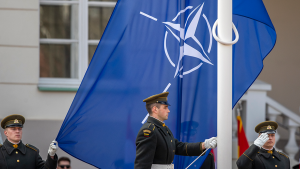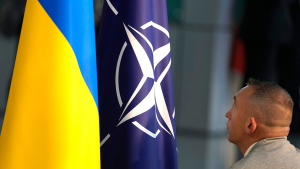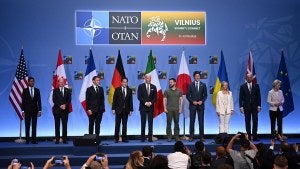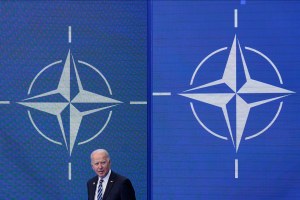But everyday Republicans are divided over the best way to encourage NATO allies to increase their defense spending.
Leaders from countries in the North Atlantic Treaty Organization (NATO)—including new members Finland and Sweden—will gather in Washington, DC, in July to celebrate the 75th anniversary of the alliance’s founding. The summit will touch on important questions about NATO’s future and next steps in aiding Ukraine in its war with Russia. While recent polls have shown that American support for continued support to Ukraine is declining, particularly among Republicans, a May 31–June 2, 2024, Chicago Council on Global Affairs–Ipsos survey shows large majorities of Americans believe the NATO alliance is essential to US security.
Key Findings
- Eight in 10 self-described Democrats (83%) and six in 10 Republicans (61%) and Independents (60%) say NATO is still essential to US security.
- The US public supports using persuasion and diplomacy to encourage NATO allies to increase defense spending in their countries (62%) rather than withholding US security commitment to NATO allies (34%).
- Republicans with a favorable view of former President Donald Trump are less positive than other Republicans about the importance of the alliance.
- Liberal Democrats are more solidly supportive of NATO than moderate/conservative Democrats, though majorities of both endorse the alliance.
Two in Three Americans Say NATO “Still Essential” to US Security
As the United States and European nations prepare to celebrate the 75th anniversary of NATO’s founding, Americans see NATO as a valuable component of US national security. Two-thirds of the overall US public (67%), including 83 percent of Democrats, 61 percent of Republicans, and 60 percent of Independents, say NATO is still essential to US security.
When first asked this question in the 2002 Chicago Council Survey, roughly two-thirds of Democrats, Republicans, and Independents said NATO was essential. More recent Council polling conducted since 2016 shows that Democrats are now far more likely than other partisans to champion NATO, while Republicans and Independents generally remain in line with their previous readings.1
Previous Council polling shows that even larger majorities across the political spectrum say the United States should maintain or increase its commitment to NATO (92% of Democrats, 68% of Republicans, and 73% of Independents.) But the partisan gap between Republicans and Democrats on support for NATO has widened since earlier surveys.
Persuasion, Not Threats, Seen as Best Way to Boost Allies’ Defense Spending
Former President Donald Trump stated in February 2024 that if reelected, he would not agree to defend NATO members that fall short of their spending targets. This statement came on the heels of another comment in which he said Russia could do “whatever the hell they want” to any NATO country that was delinquent on its defense spending. Later in March, Trump stated he would not pull the United States out of NATO if European allies paid their “fair share” of defense expenses.
In fact, NATO officials recently announced that 23 of the alliance’s members are expected to meet their 2 percent of GDP spending target in 2024, which would mark the first year this century that the European contribution would exceed 2 percent of their combined GDP.
For their part, a majority of Americans support using persuasion and diplomacy to encourage NATO allies to increase defense spending in their countries (62%) rather than withholding US security commitment to NATO allies (34%). Democrats (79%) and to a lesser extent Independents (57%) agree in the majority. Republicans are somewhat divided, with the barest majority leaning toward diplomacy (51% vs. 46% withhold defense commitment).
Americans Less Certain That NATO Makes the United States Safer
While Americans clearly recognize the value in the US-European alliance, not all are sure NATO makes the United States safer. Though the prevailing view among the US public is that the transatlantic alliance does make the United States more safe (52%), about a third say it does not make much of a difference (35%). And 11 percent say the alliance makes them feel less safe.
As is true for many issues today, there are some partisan differences on this question. Democrats (65%) are far more convinced than Republicans (41%) and Independents (50%) that transatlantic cooperation makes the United States safer. Four in 10 Republicans and the same proportion of Independents say US-European cooperation makes no difference to US security, compared to three in 10 Democrats.
While Democrats of Same Mind, Not All Republicans Share Uniform Views
Majorities of Democrats—whether they describe themselves as liberal (61% of all Democrats; 18% of overall sample) or moderate/conservative (39% of all Democrats; 12% of overall sample)—support NATO, but they do so at different levels.
- Nine in 10 liberal (91%) and seven in 10 moderate Democrats (72%) say NATO is still essential to US security.
- Eighty-seven percent of liberal Democrats, versus 66 percent of moderate Democrats, say the United States should persuade allies to increase defense spending with diplomatic means.
- Liberal Democrats (78%) are much more likely than moderate Democrats (43%) to say NATO cooperation makes the United States safer.
Those Republicans who express a very favorable view of Trump (“Trump Republicans”—54% of all Republicans; 15% of overall sample) are more skeptical toward alliances and less positive toward NATO than are other Republicans (46% of all Republicans; 13% of overall sample). For example:
- Fifty-two percent of Trump Republicans, compared to 71 percent of other Republicans, say NATO is still essential to US security.
- Thirty-nine percent of Trump Republicans, versus 65 percent of other Republicans, say the United States should use persuasion and diplomacy to convince NATO allies to increase defense spending.
- Fifty-eight percent of Trump Republicans, versus 32 percent of other Republicans, prefer to withhold the US commitment to defend NATO allies until they actually boost defense spending.
- At the same time, however, no more than two in 10 Trump Republicans say the United States should either reduce (11%) or withdraw (9%) from US alliances and security commitments; no more than one in 10 other Republicans say the same (7% reduce, 4% withdraw).
- Thirty-five percent of Trump Republicans say US cooperation with NATO makes the United States safer, compared with 48 percent of other Republicans.
Conclusion
Throughout all 50 years of Chicago Council on Global Affairs polling, Americans across the political spectrum have expressed support for the NATO alliance, and majorities think that either expanding or maintaining current alliance partners is good for US security. At the same time, however, divided views among everyday Republicans on the best way to encourage allies to spend more on their defense reflects some agreement with former President Donald Trump’s America-first approach.
- 1
The March 2022 survey was conducted just after the Russian invasion of Ukraine, which elevated support for NATO to all-time highs across the political spectrum.
This analysis is based on data from a joint Chicago Council on Global Affairs / Ipsos survey. It was conducted May 31-June2, 2024 by Ipsos using its large-scale, nationwide, online research panel, KnowledgePanel, among a weighted national sample of 1,017 adults 18 or older living in all 50 US states and the District of Columbia. The margin of sampling error for the full sample is ±3.3 percentage points including a design effect of 1.19.
The data for the total sample were weighted to adjust for gender by age, race/ethnicity, education, Census region, metropolitan status, and household income using demographic benchmarks from the 2023 March Supplement of the Current Population Survey (CPS). Specific categories used were:
- Gender (Male, Female) by Age (18–29, 30–44, 45-59 and 60+)
- Race/Hispanic Ethnicity (White Non-Hispanic, Black Non-Hispanic, Other, Non-Hispanic, Hispanic, 2+ Races, Non-Hispanic)
- Education (Less than High School, High School, Some College, Bachelor or higher)
- Census Region (Northeast, Midwest, South, West)
- Metropolitan status (Metro, non-Metro)
- Household Income (Under $25,000, $25,000-$49,999, $50,000-$74,999, $75,000-$99,999, $100,000-$149,999, $150,000+)
Partisan identification is based on how respondents answered a standard partisan self-identification question: “Generally speaking, do you think of yourself as a Republican, a Democrat, an Independent, or what?”
The margin of error is higher for partisan subgroups: ±6.1 points for Republicans, ±5.9 points for Democrats, and ±5.5 points for Independents.





Related Content
 Global Politics
Global Politics
Matt Kaminski, Sylvie Kauffmann, and Giles Whittell join Ivo Daalder to discuss the week's top news stories.
 Global Politics
Global Politics
"The security of allies isn’t a question of dollars and cents — it is the key to America’s security as well," argues Ivo Daalder.
 US Foreign Policy
US Foreign Policy
"Without new US military assistance, Ukrainian ground forces may not be able to hold the line against a relentless Russian military," argues Ivo Daalder.
 Public Opinion
Public Opinion
As the war in Ukraine continues, majorities say the United States should maintain or increase its commitment to NATO.
